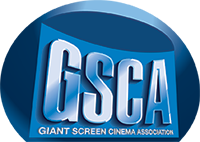 As I sit down to write, I have a lump in my throat. I recently retired after 37 years as a science museum CEO. And sometimes I choke up with gratitude for having had that opportunity to serve what I love. I have been deeply invested all these years in positioning the museums I led not only as institutions known for science education but also as community beacons that foster community spirit, family learning, youth development with an eye to workforce development and…. pure unadulterated fun. When the fun is there, the people will be there too—giving a museum a receptive audience for the messages we consider important. That’s where “my” giant screens always came into play. Literally and figuratively.
As I sit down to write, I have a lump in my throat. I recently retired after 37 years as a science museum CEO. And sometimes I choke up with gratitude for having had that opportunity to serve what I love. I have been deeply invested all these years in positioning the museums I led not only as institutions known for science education but also as community beacons that foster community spirit, family learning, youth development with an eye to workforce development and…. pure unadulterated fun. When the fun is there, the people will be there too—giving a museum a receptive audience for the messages we consider important. That’s where “my” giant screens always came into play. Literally and figuratively.
“I have consistently been rewarded with strategic insights, inventive marketing tips, and candid conversations about mutual concerns unfiltered by the jargon of the latest academic fad.”
I have been drawn to this organization both professionally and personally, ever since first attending in the 1980’s a meeting of ISTC (International Space Theater Consortium), the first iteration of what eventually became GSCA. At GSCA conferences and expos I have consistently been rewarded with strategic insights, inventive marketing tips, and candid conversations about mutual concerns unfiltered by the jargon of the latest academic fad. The peer-to-peer networking among museum and theater professionals has of course been valuable. The business relationships fostered by attendance at GSCA events have positively reinforced my theaters’ successes. The friendships formed have enhanced my life in a multitude of ways.
“The business relationships fostered by attendance at GSCA events have positively reinforced my theaters’ successes.”
On the flip side of what my museums and I have gained by fully participating in GSCA is the engagement and loyalty that we need to give back to GSCA to support the industry. It is tougher than ever now—and in a tough environment, one needs support. GSCA always had my back as a museum director; so as a director who cared passionately about the value of my giant screen theaters, I had a responsibility to participate.
Thinking back about our collegial history in the giant screen world, I am speculating that many of us initially promoted our theaters for their value as “spectacle,” and we did a good job of positioning them in the public consciousness in that light. But in many museums, the theaters came to be valued by staff and board only as cash cows, to the exclusion of their real value as both educational tools and presentation venues for subjects not easily addressed in exhibits on the museum floor. When commercial theaters began to catch up with IMAX theaters in presentation style, when TV began to catch up with giant screen films in natural history and conservation content (even before people became addicted to their cell phones), the cash cow business began to take a dive.
Some museums, mine included, addressed this slide by beginning to include Hollywood product in our daily schedules. This maneuver tended to transition the theater back into a role that could support the bottom line while still maintaining screen space for documentary films as educational tools. This business model has been criticized by some purists as neglecting science education. I would counter that it has enabled the museum to address community interests and needs in an alternative way, one that has brought audiences, support and excitement, often from those who never previously bothered to access the more “serious” content of the museum.
“GSCA is the only organization that creates the supportive environment that nurtures our industry.”
I continue to support the industry by remaining involved with GSCA. GSCA is the only organization that creates the supportive environment that nurtures our industry—that brings together those who care about the educational and/or social impact a great giant screen film can have, those who finance, create, and distribute the art and science that we bring to our screens, and those whose technical invention or product makes it all possible.
This industry remains close to my heart. We need to support it not because it’s easy but because it’s hard… didn’t JFK say something like that?
Kim L. Cavendish has led museums since 1981 and during that time she served as the chief executive officer for Orlando Science Center, the Virginia Air and Space Center, and the Museum of Discovery and Science, along with its forerunner, The Discovery Center. She currently serves on the GSCA Board of Directors and served two terms as Chair.
